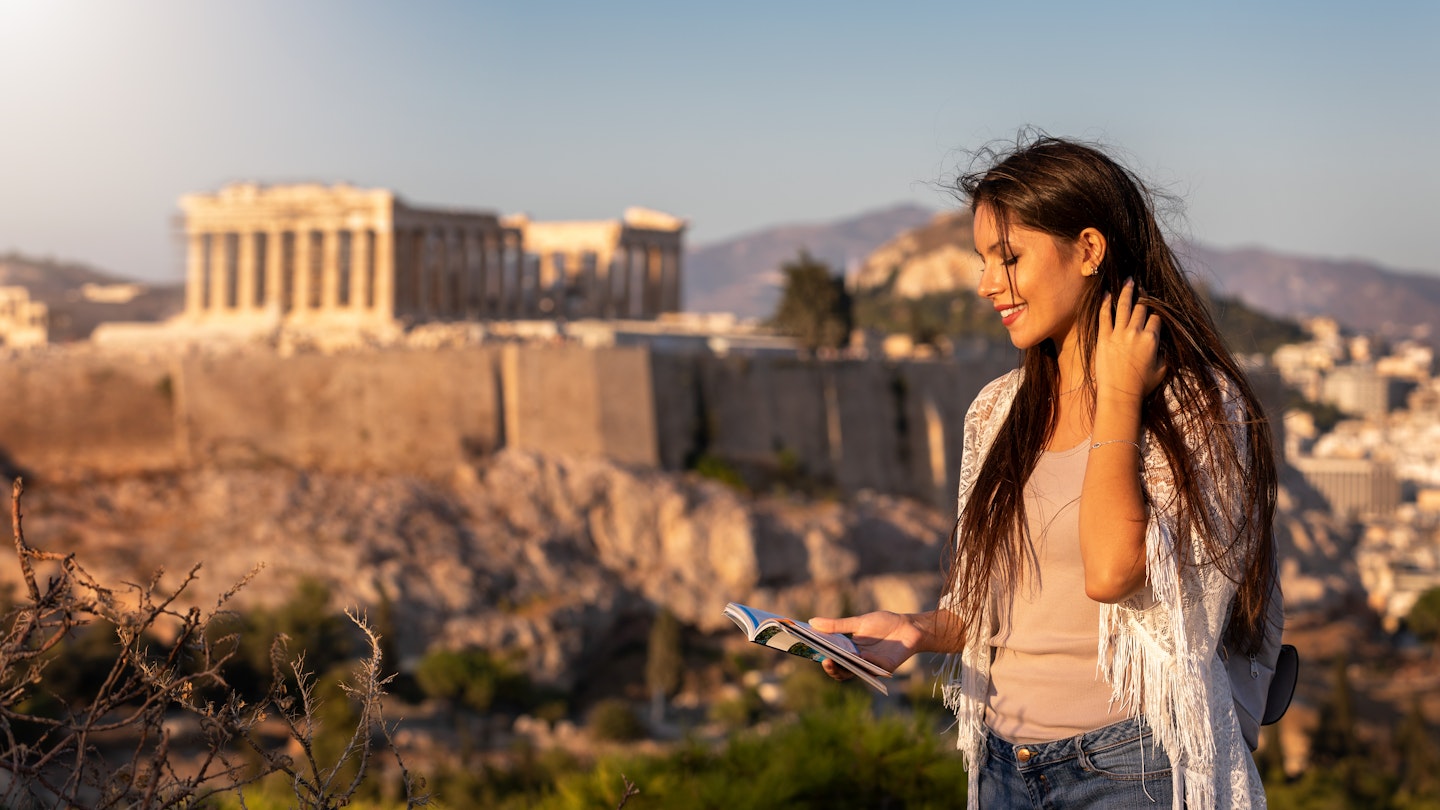What does the word “Greece” conjure in your mind? Deep-azure seas, crisp-white beaches, long lunches of delectable seafood and fresh-made feta? The ancient temples dedicated to those towering figures of Greek mythology – the gods of Mount Olympus – certainly come to mind. Therefore, what better way to structure a trip to this storied land than by following in their footsteps? The places they battled, loved, and lost are fascinating spots for the 21st-century traveler, comprising a grand tour throughout modern-day Greece.
Get to know Athena’s city of Athens
What better place to start than the city of Zeus’ wisest daughter, Athena? Born from the head of her father, she battled Poseidon on the heights of the Acropolis to see who would be the nascent city’s patron. With her presentation of the olive tree, a gift to the Athenian people that would give nourishment, light, and warmth, she won handily, and the city’s Parthenon is dedicated to her.
Take your troubles to the Oracle in Delphi
As you make your way north, you come to Ancient Delphi and the gorgeously situated Sanctuary of Apollo, where the Oracle made her legendary pronouncements. Apollo slayed Python here, and it was this god who endowed the Oracle. He spoke his answers through a local woman (who had to be more than 50 years old), and then a priest interpreted the response in a poem. Bring any questions that have been haunting you and come early in the day, both to see the sun play across the hillsides and to beat the crowds.
Stop by the Home of the Gods at Mt Olympus
Continue north to the magnificent seat of the gods: Mt Olympus. It’s a perfect spot to stay over for a few nights, hiking the hillsides and listening for the rustle of Hermes’s winged feet as he returns to report to Zeus on the hijinks occurring across the land. Furthermore, Olympus is a naturalist’s paradise, home to an enormous range of plant species and about 100 species of birds – including the golden eagle, Zeus’ companion – plus foxes, wolves, and other roaming animals.
Cross the border to the underworld at the Acheron River
Next, make your way to northwestern Greece’s wild and wonderful Epiros region to visit the border between the living and the dead at the Acheron River. Charon ferried the souls of the dead across this river to reach the underworld; today you’re better off boating or hiking along its edges.
Journey to Odysseus’ home in Ithaki
As you continue your personal odyssey, a stop at the home of Odysseus on the island of Ithaki offers a welcome respite, with the cheery main harbor town of Vathy and its peaceful trails crisscrossing the small island.
See where Hercules slayed the lion at Nemea
Further south lies the multifaceted Peloponnese peninsula, a veritable playground for the adventurous Greek gods. Ancient Nemea is significant as the site where Heracles (aka Hercules) killed the lion – the first of his twelve challenges to redeem his sin of killing his wife and children in a fit of madness induced by Hera. Notably, Nemea is also a sanctuary to Zeus and the site of the Nemean Games held in his honor – you can stroll the ruins of the ancient stadium.
Play like Pan in Arcadia
Now it’s time for extra fun: explore the hinterlands of the Arcadia region of Greece in search of Pan and the myriad dryads, naiads, and other nymphs who called its forests home. To aid your search, dryads lived in trees, and naiads in flowing water, like springs, rivers, and cascades. Moreover, Pan was a pastoral deity associated with wild mountain and forest lands, who watched over shepherds and flocks. With that mindset, Arcadia is also home to some excellent wineries, specializing in the popular local grape Moschofilero. A convenient base for your exploration is the charming village of Dimitsana.
Swim where Aphrodite rose from the sea at Kythira Island
In one of Greek mythology’s most dramatic births, the lovely goddess Aphrodite is said to have arisen from the sea foam where Uranus’s genitals were tossed when he was castrated by his son Cronus. Two places are proposed to be that location, both dedicated to Aphrodite: Pafos, in Cyprus, and beautiful Kythira Island, just off the southern tip of the Peloponnese. The latter is a wonderful place for a sojourn, especially outside of August high season, when the island is quiet and you can frolic in Aphrodite’s waters on your own.
Visit the birthplace of Apollo and Artemis in Delos
Improbably located just off the shores of storied party playground Mykonos, the island of Delos is blanketed by the ruins of both sacred sanctuaries and a commercial hub that were the center of the Greek world. Inhabited since 3000 BCE, this ancient crossroad was the birthplace of god-twins Apollo and Artemis, and a financial capital to boot. Today it makes a brilliant antidote to the modern ways of Mykonos, as you cast your mind back through the millennia of life and lore on Delos.
Crawl into the cave(s) where Zeus was born in Crete
So where was the top god born? Two caves in Crete vie for that distinction: Mt Psiloritis’ Ideon Cave, or Dikteon Cave in eastern Crete’s Lasithi Province. As the story goes, the Titan leader Cronus – busy swallowing his children after learning one of them was destined to overthrow him – didn’t notice when his wife/sister Rhea substituted rocks in Zeus’ swaddling blanket and stashed the real baby in a cave to be nursed by a nymph (or, in an alternate story, by a goat). That baby grew up to be the god of thunder and the sky, the king of all gods – and he also saved his siblings from Cronus’ stomach.





